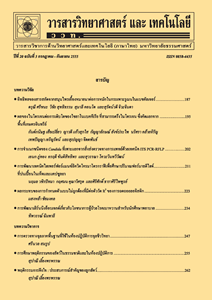ผลของตัวเร่งปฏิกิริยาซีโอไลต์ชนิด FAU BEA และ MFI ต่อการแตกตัวเชิงเร่งปฏิกิริยาของอะคริลิก
Main Article Content
Abstract
Abstract
The purpose of conducting research was to study the effect of heterogeneous catalyst, namely FAU-, BEA- and MFI-type zeolites on the catalytic cracking of acrylic to recover monomer or valuable substances using a high-pressure batch reactor under oxygen-free atmosphere. The results showed that the cracking of acrylic at a temperature of 300 oC could occur in the presence of zeolites. Acidity of three different types of zeolites seemed to vary dependently on framework structures, in spite of their quite equivalent SiO2/Al2O3 ratios. The degree of zeolites acidity significantly influenced the product distribution in gaseous, liquid and solid form whilst the composition of the liquid fraction directly related to the shape selectivity of the zeolites. FAU type zeolite was found to be the most appropriate catalyst for recovery of monomer or valuable substances including methyl methacrylate monomer since it yielded highest liquid products up to 83 weight percentages whereas MFI type zeolite with high acidity was effective in producing gaseous and solid products. In this research, approximately 21 to 26 weight percentages of monomer could be recovered, depending on the zeolite used.
Keywords: catalytic cracking; zeolite; catalyst; acrylic
Article Details
References
[2] Kaminsky, W., Predel, M. and Sadiki, A., 2004, Feedstock recycling of polymers by pyrolysis in a fluidised bed, Polym. Degrad. Stab. 85: 1045-1050.
[3] Smolders, K. and Baeyens, J., 2004, Thermal degradation of PMMA in fluidised beds, Waste Manage. 24: 849-857.
[4] Scheirs, J. and Kaminsky, W., 2006, Feedstock Recycling and Pyrolysis of Waste Plastics: Converting Waste Plastics into Diesel and Other Fuels, John Wiley & Sons, Wiltshire. 785 p.
[5] Achyut, K.P., Singh, R.K. and Mishra, D.K., 2010, Thermolysis of waste plastics to liquid fuel: A suitable method for plastic waste management and manufacture of value added products: A world prospective, Renew. Sust. Energ. Rev. 14: 233-248.
[6] นีรา วงศ์ทยานุวัตร, มาลี สันติคุณาภรณ์ และชาญณรงค์ อัศวเทศานุภาพ, 2561, การสังเคราะห์เชื้อเพลิงเหลวจากน้ำมันหล่อลื่นที่ใช้แล้วโดยกระบวนการไพโรไลซิส, ว.วิทยาศาสตร์และเทคโนโลยี 26(2): 354-362.
[7] Weitkamp, J. and Puppe, L., 2010, Catalysis and Zeolites: Fundamentals and Applications, Springer, Heidelberg, 564 p.
[8] Aguado, J., Serrano, D.P. and Escola, J.M., 2008, Fuels from waste plastics by thermal and catalytic processes: A review, Ind. Eng. Chem. Res. 47: 7982-7992.
[9] Chester, A.W. and Derouane, E.G., 2010, Zeolite Characterization and Catalysis: A Tutorial, Springer, Heidelberg, 358 p.
[10] Wong, S.L., Ngadi, N., Abdullah, T.A.T. and Inuwa, I.M., 2017, Conversion of low density polyethylene (LDPE) over ZSM-5 zeolite to liquid, Fuel 192: 71-82.
[11] Jiraroj, D., Chaipurimat, A., Kerdsa, N., Hannongbua, S. and Tungasmita, D.N., 2016, Catalytic cracking of polypropylene using aluminosilicate catalysts, J. Anal. Appl. Pyrol. 120: 529-539.
[12] Garforth, A.A., Ali, S., Martíneza, J.H. and Akah, A., 2004, Feedstock recycling of polymer wastes, Curr. Opin. Solid State Mater. Sci. 8: 419-425.
[13] Buzetzki, E., Sidorová, K., Cvengrošová, Z., Kaszonyi, A. and Cvengroš, J., 2011, The influence of zeolite catalysts on the products of rapeseed oil cracking, Fuel Process. Technol. 92: 1623-1631.
[14] Treacy, M.M.J. and Higgins, J.B., 2001, Collection of Simulated XRD Powder Patterns for Zeolites, 4th Ed., Elsevier, Amsterdam, 586 p.
[15] Baerlocher, C., McCusker, L. and Olson, D.H., 2007, Atlas of Zeolite Framework Types, 6th Ed., Elsevier, Amsterdam, 404 p.
[16] Ngamcharussrivichai, C., Wu, P. and Tatsumi, T., 2005, Active and selective catalyst for liquid phase Beckmann rearrangement of cyclohexanone oxime, J. Catal. 235: 139-149.
[17] Damjanović, L. and Auroux, A., 2010, Determination of Acid/Base Properties by Temperature Programmed Desorption (TPD) and Adsorption Calorimetry, pp. 107-167, In Chester, A.W. and Derouane, E.G., Zeolite Characterization and Catalysis: A Tutorial, Springer, Heidelberg.
[18] Pielichowski, K. and Njuguna, J., 2005, Thermal Degradation of Polymeric Materials, Rapra Technology Limited, Shropshire, 306 p.
[19] Manos, G., Garforth, A. and Dwyer, J., 2000, Catalytic degradation of high-density polyethylene over different zeolitic structures, Ind. Eng. Chem. Res. 39: 1198-1202.
[20] Adjaye, J.D. and Bakhshi, N.N., 1995, Production of hydrocarbons by catalytic upgrading of a fast pyrolysis bio-oil. Part II: Comparative catalyst performance and reaction pathways, Fuel Process. Technol. 45: 185-202.
[21] Liu, C., Deng, Y., Pan, Y., Gu, Y., Qiao, B. and Gao, X., 2004, Effect of ZSM-5 on the aromatization performance in cracking catalyst, J. Mol. Catal. A: Chem. 215: 195-199.
[22] Corma, A., Huber, G.W., Sauvanaud, L. and O’Connor, P., 2007, Processing biomass-derived oxygenates in the oil refinery: Catalytic cracking (FCC) reaction pathways and role of catalyst, J. Catal. 247, 307-327.
[23] Elordi, G., Olazar, M., Artetxe, M., Castaño, P. and Bilbao, J., 2012, Effect of the acidity of the HZSM-5 zeolite catalyst on the cracking of high density polyethylene in a conical spouted bed reactor, Appl. Catal. A 415-416: 89-95.
[24] Rahimi, N. and Karimzadeh, R., 2011, Catalytic cracking of hydrocarbons over modified ZSM-5 zeolites to produce light olefins: A review, Appl. Catal. A 398: 1-17.

